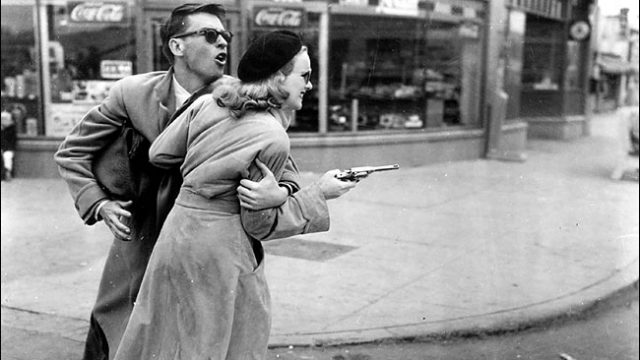Bart loves guns. He started young with slingshots before trading a chipmunk for a BB gun. We learn this in courtroom testimony after he’s caught smashing a store window and stealing a gun from the display. It’s the opposite of armed robbery and Bart’s the opposite of what we expect a gun nut to be. He’s a complete pacifist, opposed to shooting any living thing. He once killed a baby chick and it made him weep. Years later when aiming at a mountain lion, the chick’s phantom peeps come back to him and he refuses to shoot.
The judge is unmoved. It’s off to reform school and then the army for Bart. Cut to several years later where Bart (now played by John Dall) isn’t more violent for his experiences, but his fondness for shooting continues unabated. A carnival shooting exhibition introduces him to “Annie” Laurie Starr. Laurie enters firing her pistols in the air. She aims one at Bart and pulls the trigger. It fires a blank. He laughs. It’s love at first sight, so to speak.
This picture moves like it has its own date waiting, so about three scenes later Laurie and Bart get a quickie wedding in the desert. In a montage they buy a ring, have night out in Vegas, then hock the ring. Laurie compels Bart into a string of robberies. He’s not as reluctant as she is persistent and the robberies get more frequent and elaborate. He could do without the heat and the guilt but he can’t do without Laurie and she makes it clear if he stops the spree, she will leave him. From there it’s a matter of which stand will be their last.
Gun Crazy premiered with the title Deadly is the Female. A nuanced exploration of gender dynamics this is not, as the movie makes clear that Bart’s problem is the second chick he can’t get out of his head. Laurie is a textbook noir femme fatale, a beguiling one as performed by Peggy Cummins and more fatale than most, but not much more than the trope. The shift in title happily shifts the focus to the more interesting relationship.
“It’s something else about guns that gets him,” Bart’s sister testifies on his behalf. “Not the killing.” Young Bart’s school teacher, who precipitated the store window theft by confiscating the gun Bart showed off to his peers, argues that his obsession is harmless and that he needs guns “just as other boys have to have jackknives or harmonicas or baseball bats.” (I picture a terrified boy and his harmonica hiding at recess.) Plenty of people interact with guns on a regular basis and regard them as tools or toys, but if Bart’s gentle fetishistic relationship to guns would be odd in real life, it’s crazy for the movies. He feels good when he shoots but not when he shoots living things, though this is what most guns are designed to do and what most movies are designed to have people do.
The Western and the Noir have overlapped repeatedly in 1950, and when Bart falls for Laurie, she’s wearing an Old West costume for her carnival performance. It’s the kind of relationship he wants, a play-acting of the time when the general population carried guns but where rivals only point them at targets. In noir there’s no proximity to guns without consequence, however. Bart can’t be into guns without getting into gun people.
The filmmaking reflects Bart’s slide from harmless to threatening. Gun Crazy is celebrated for its long takes shot from the back of vehicles driven by actors. As opposed to the usual objective role of the camera in much of this movie these shots have an immediacy that, considering the film’s age and meager budget, are astonishing. The camera jostles as the car hits bumps and captures details out the windows while still getting perfect exposure when the actors glance behind. The driving is real and the lines are improvised. There’s a tension in these scenes as the actors contend with the real conditions of the road and traffic. The technique justifies itself with the entertainment value. It also contributes to the intrusion the robberies have on Bart’s world, which becomes more cluttered with traffic and potential casualties.
In the end Bart only shoots one person. His marksmanship is as true as his heart in the clash of his two loves in life. You can’t choose where to aim your passions in noir, and the genre will make you pay. If only he’d been into the harmonica instead.

